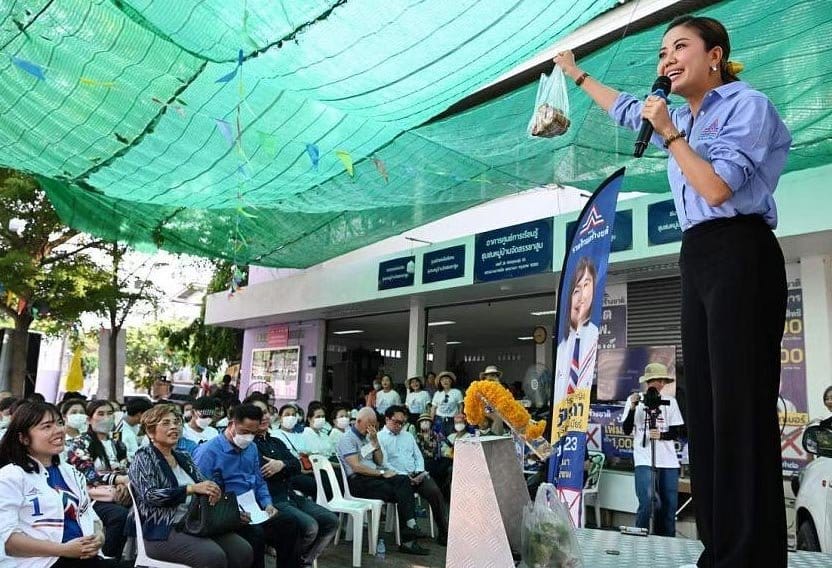May 9, 2023
BANGKOK – Popular childhood games in Thailand include marbles, “finger guessing” and takraw. For Ms Sirikanya Tansakun, her favourite game with her late father was something else altogether.
“He would yell the name of a politician, and I would yell the last name, or vice versa. That was our game, and it made me really interested in politics when I was young,” Ms Sirikanya told The Straits Times.
The game, which evolved from their shared hobby of reading the newspapers together, eventually helped propel her into politics. Today, the 42-year-old former academic is making waves as a deputy leader of opposition party Move Forward. She is also the youngest economic team leader among the major political parties contesting in Thailand’s upcoming May 14 election.
And then there is Ms Tipanan Sirichana, 39.
Coming from the pro-establishment United Thai Nation (UTN) party that is trying to bring incumbent Prime Minister Prayut Chan-o-cha back as premier, she has had to deal with some tough questions from voters who dislike the former coup leader.
“But I have seen the way he works and his plans on how to improve Thailand. So, I believe in him and in the party policies,” said Ms Tipanan, a former lawyer who is deputy spokesman of the caretaker government.
The two women are among a growing number of younger candidates in their 30s and early 40s in a political landscape crowded with male politicians in their 50s and 60s.

United Thai Nation party candidate Tipanan Sirichana, 39, speaking at a rally in the Bangna district of Bangkok on April 29. ST PHOTO: STEPHANIE YEOW
With different perspectives and beliefs, these fresh-faced politicians are injecting progressive politics into the mix and giving traditionalist parties a facelift with their reach among younger voters and on social media.
Ms Sirikanya’s Move Forward party, for instance, touts a progressive agenda, which includes election promises to rewrite the junta-drafted constitution and amend the lese-majeste law – both deemed controversial by conservative society.
The former academic directs policy for Move Forward, which is led by Mr Pita Limjaroenrat, also 42.
According to opinion polls, the party has a strong support base among young and first-time voters. In the coming election, those aged 42 and below make up about half of the electorate.
The emergence of more fresh faces in recent years is in part due to Move Forward’s entry into the landscape, said political scientist Wanwichit Boonprong, noting that the party’s move to field younger candidates has spurred others to take a leaf out of its book.
“I think there is a high likelihood that we will see a growing number of younger politicians than before,” he said, adding that he has noticed this trend since the 2019 election.
The average age of Move Forward MPs is 44, compared with over 57 in other political parties, noted think-tank Thailand Development Research Institute in a 2023 article. Meanwhile, Thailand’s Cabinet, which is also predominantly male, has an average age of 65.
“As the younger generation, we should change the landscape of Parliament,” said Ms Sirikanya.
Even Thailand’s traditionally conservative parties have younger faces stepping up.
The ruling party Palang Pracharath’s (PPRP) Bangkok election strategy is headed by Mr Sakoltee Phattiyakul, 45, the capital’s former deputy governor.
And at the forefront of the Democrat party’s game plan for Bangkok is Ms Watanya Bunnag, 38, who wants to help the party reclaim MP seats it lost in the 2019 polls.
She says younger politicians like herself are taking up key positions in parties, and she believes they are motivated by the hope for change.
“As a mother of the two, I want to create a better future for my family. And if I can do it, I can create a better future for other people’s families as well,” said Ms Watanya, a former director of a media group.

Ms Watanya Bunnag, 38, is one of the key figures spearheading the Democrat party’s election campaign in Bangkok. ST PHOTO: STEPHANIE YEOW
An issue she wants to address is Thailand’s economic inequality, one of the highest in the world, which she said can only be solved through structural changes and education.
She joined the Democrat party, the oldest political party in Thailand, after she quit PPRP, where she was an MP in 2022.
On those who criticise younger candidates for their lack of experience, she said: “I challenge them and say that the world has changed. The CEOs for some of the top corporations in the world are millennials.”
While others may assume that the UTN is a party with conservative views, Ms Tipanan says it makes room for discussion – and despite differing opinions, its members always come to a consensus. She, too, had been with the PPRP and joined the UTN earlier this year as an election candidate shortly after Mr Prayut officially joined the party.
“Look at me and other candidates. This is evidence the party gives opportunities to women and younger people,” she said. The UTN’s secretary-general is 37-year-old Akanat Promphan.
Younger candidates have used social media to drum up support for their campaigns, and opposition Pheu Thai candidate Jiraporn Sindhuprai, 35, is one example.
Ms Jiraporn, who is seeking to retain her seat in the north-eastern province of Roi Et in this election, has more than 180,000 followers on Tiktok and thousands more on Twitter and Instagram. Many fan pages are dedicated to her, and crowds of girls and women often attend party rallies to see her.
She entered Parliament in 2019 and shot to fame among young netizens, who have taken to her composed nature and sharp wit when engaged in parliamentary debates against veteran politicians from the ruling coalition.
While some of her fans are not old enough to vote yet, she told ST it is good that young people take an interest in politics.
After finishing her master’s degree at Oxford University in 2017, Ms Tidarat Yingcharoen, 33, decided to contest in the 2019 election under the Pheu Thai banner.
But in 2021, she joined the Thai Sang Thai Party, led by veteran politician Sudarat Keyuraphan, who had left Pheu Thai to start the new party.

Ms Tidarat Yingcharoen, 33, of Thai Sang Thai Party, speaking at a political debate ahead of the May 14 election. ST PHOTO: STEPHANIE YEOW
“Some older, more experienced politicians feel like they’ve achieved a lot. So they look down on you and don’t treat you as an equal. But (Dr Sudarat) is different,” she said.
Ms Tidarat is the daughter of a Burmese refugee, and her family opened an orphanage in their hometown of Chiang Rai. Her experiences have made her an advocate for equitable education, and a major election promise for the party is to provide free education until university level.
“For someone who came from a background of negative social capital, the access to education has changed my life,” said Ms Tidarat, who is the party’s youngest executive member.
She jokes that she has to wear high heels to be seen at crowded events, but the party spokesman has established her political presence by representing her party at numerous pre-election debates.
“I might not have the experience others do, but I can still contribute with different perspectives and ideas,” said Ms Tidarat, adding that as a new-generation politician, she engages with information on digital platforms and has closer relationships with student groups.
But still, there have been instances when outsiders underestimate her position in the party, thinking that she is someone’s assistant or daughter.
“I have to prove myself every day and tell others why my voice needs to be heard,” she said.


